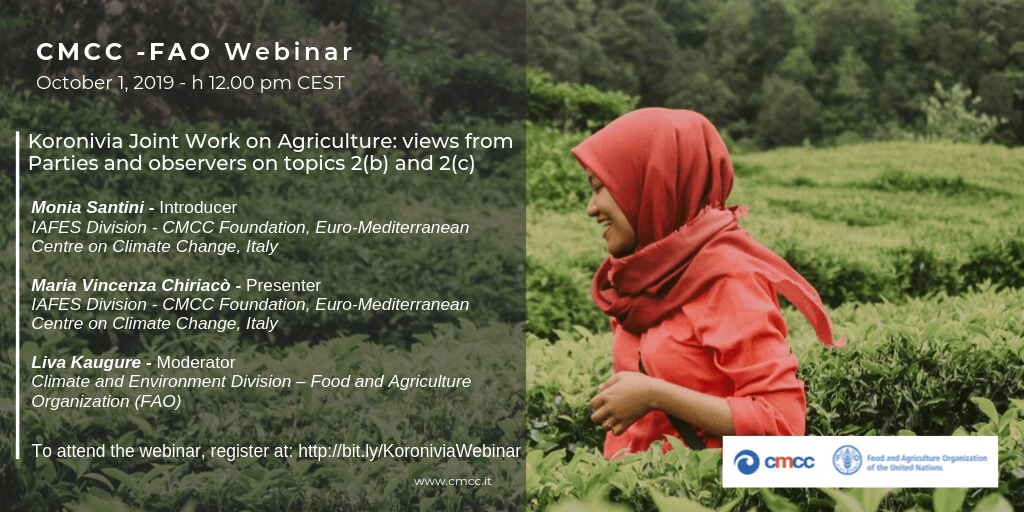CMCC-FAO Webinar | 1 October, 2019 – h. 12:00 pm CEST
Presenter:
Maria Vincenza Chiriacò, Researcher at CMCC Foundation Euro-Mediterranean Center on Climate Change, IAFES Division
Introduced by:
Monia Santini, Researcher at CMCC Foundation Euro-Mediterranean Center on Climate Change, IAFES Division
Moderator:
Liva Kaugure, Climate and Environment Division – Food and Agriculture Organization (FAO)
The historic Koronivia Joint Work on Agriculture (KJWA) decision, adopted at COP 23, recognizes the fundamental importance of agriculture in tackling climate change. The KJWA calls for joint work between the Subsidiary Body for Scientific and Technological Advise (SABSTA) and the Subsidiary Body of Implementation (SBI) with the aim to take into consideration the vulnerabilities of agriculture to climate change and approaches to address food security.
Paragraph 2 of the KJWA decision provides a list of initial elements on which Parties and observers to the UNFCCC were invited to submit their views:
- Modalities for implementation of the outcomes of the five in-session workshops on issues related to agriculture and other future topics that may arise from this work;
- Methods and approaches for assessing adaptation, adaptation co-benefits and resilience;
- Improved soil carbon, soil health and soil fertility under grassland and cropland as well as integrated systems, including water management;
- Improved nutrient use and manure management towards sustainable and resilient agricultural systems;
- Improved livestock management systems;
- Socioeconomic and food security dimensions of climate change in the agricultural sector.
FAO in collaboration with CMCC as part of the project “Supporting Implementation of the Koronivia joint work on agriculture roadmap” supported by the German Federal Ministry for Food and Agriculture (BMEL) is producing a summary of the submissions provided by Parties and observers to the UNFCCC on the topic 2(b) – Methods and approaches for assessing adaptation, adaptation co-benefits and resilience and topic 2(c) – Improved soil carbon, soil health and soil fertility under grassland and cropland as well as integrated systems, including water management, discussed during the SABSTA 50 (Bonn, June 2019). The summary aims to make the wide range of views submitted more easily accessible to all interested and to support efforts to identify a joint way forward for climate action in the agricultural sectors.
Agenda
12.00 pm – Welcome – Monia Santini (CMCC)
12:05 pm – Intro from the moderator – Liva Kaugure (FAO)
12.10 pm – Presenter’s talk – Maria Vincenza Chiriacò (CMCC)
12:30 pm – Q&A Session – moderated by Liva Kaugure (FAO)
12:50 pm – End of Webinar
Working language: English
Liva Kaugure, Natural Resources Officer. With the technical background in land administration, Liva supports FAO’s engagement in Global Climate Action Agenda and UNFCCC related processes. Furthermore, she has been following negotiations on Koronivia Joint Work on Agriculture as well as supporting the development of various FAO publications related to the KJWA. Liva co-facilitates FAO’s Technical Network on Climate Change and has supported the development of corporate knowledge resources and learning materials on climate change.
Watch the video:
How to participate
The seminar will be broadcasted via Go-to-Webinar.
Please, click on the following link for registration:
https://register.gotowebinar.com/register/3662128386910457089
After registering, you will receive a confirmation email containing information about joining the webinar.
Organizza
Fondazione CMCC – Centro Euro-Mediterraneo sui Cambiamenti Climatici
FAO – Climate and Environment Division (CBC)
Under the project “Supporting Implementation of the Koronivia joint work on agriculture roadmap” supported by the German Federal Ministry for Food and Agriculture (BMEL).
Contacts


